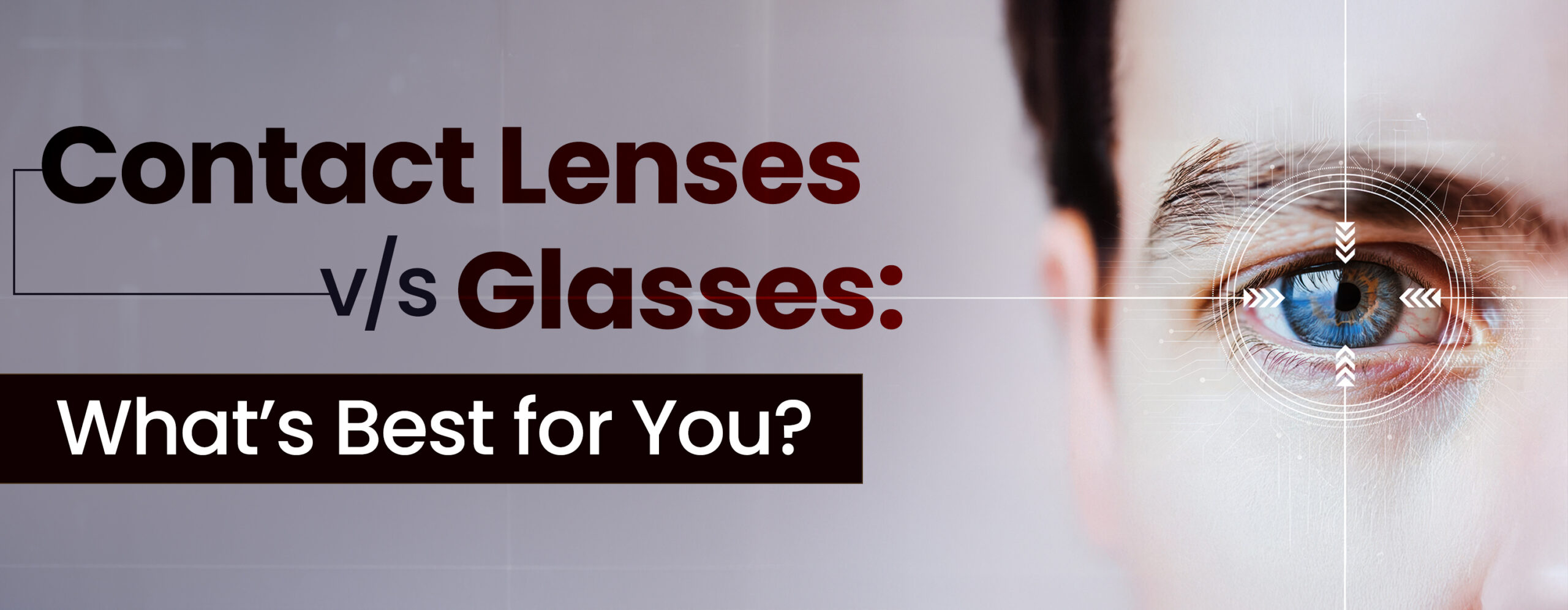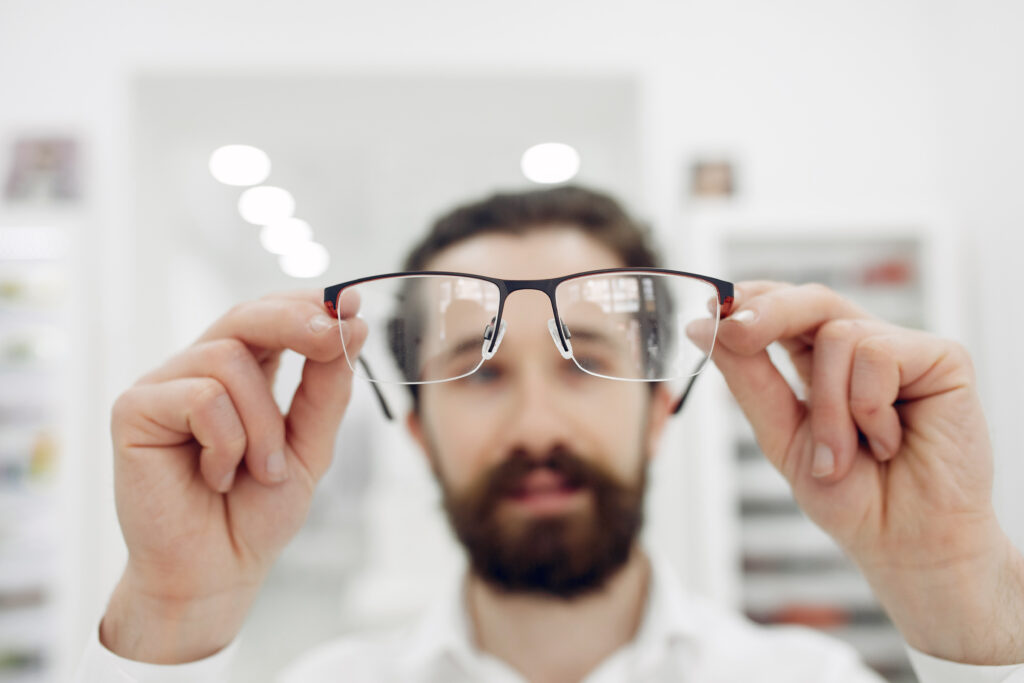
-
 Posted By shubham dhyani
Posted By shubham dhyani -
-
Comments 0
When you find yourself facing the choice of how to correct your vision, it can feel like a personal puzzle: glasses or contact lenses? Each has its own perks, and what works best really depends on your day-to-day life, what feels comfortable, and how your eyes respond. Taking a consultation from a contact lens specialist can clear up the confusion and help you understand what truly fits you.
Most of the time, people always wonder which option will keep them comfortable in their daily lifestyle. Let’s go through this simple guide and understand what makes each choice unique so you can make the best decision.
Contact Lenses: Features and Suitability
Contact lenses are small, thin, curvy discs that are put right on the surface of your eye to correct your vision. Because they move with your eye so that they don’t get in the way like glasses frames do, one of the strong differentiating features compared to glasses that lenses offer is that they provide a wider and more natural view. There are several types of lenses:
- Soft lenses are more flexible and comfortable
- Rigid gas-permeable lenses provide sharper vision in some cases
- Toric lenses designed for astigmatism
- Multifocal lenses for those needing different prescriptions at once
- Scleral lenses that cover more of the eye for specific conditions.
For many people, lenses provide freedom for playing sports, maintaining a look, or avoiding foggy lenses. But they do also require good hygiene and regular care. They need to be properly cleaned and fitted correctly. They can cause discomfort, dryness, or even infections if lenses don’t fit well.
That’s why consulting a contact lenses specialist is very crucial. They have the expertise to recommend lenses that suit your eye shape, provide a prescription, and lifestyle to keep your eyes healthy.
Glasses: Features and Benefits

Glasses are most people’s first and best reliable choice to correct their vision. For Example
- Unlike contacts, they don’t touch your eyes, which means there’s less chance of irritation or infection.
- Glasses also come with a variety of prescription lens options to meet different needs, such as
- Single vision lenses for basic nearsightedness or farsightedness
- Bifocals and progressives for multiple focal distances
- Lenses with UV protection to shield your eyes from harmful sunlight.
- Cleaning them is very easy, and they require little maintenance compared to contact lenses.
- Plus, glasses protect your eyes from environmental elements like dust, wind, and waste particles.
- They offer a variety of style Glasses frames you can choose as per the trend, style and attire you are having.
Glasses have their downsides. They feel heavy, slip down your nose, or fog up. Deciding if glasses are right for you depends on weighing these practical factors alongside your comfort and lifestyle.
Comparing Eye Comfort
Aspect | Contact Lenses | Glasses |
Comfort | Putting it directly on the eye can cause dryness or irritation if not well-fitted or with poor hygiene. | Rest on the nose and ears; no direct eye contact, generally less irritation. |
Maintenance | Require daily cleaning and proper storage; improper care increases infection risk. | Easy to clean; minimal maintenance needed. |
Environmental Factors | Can be uncomfortable in dusty, dry, or polluted environments; sensitive to air conditioning. | Provide some protection against dust and wind. |
Suitability for Sensitive Eyes | It may not be suitable for people with chronic dry eyes or allergies. | Better suited for sensitive eyes due to no contact with the eye surface. |
Adaptation Time | May require an adjustment period; initial discomfort is common. | Usually comfortable from the first use. |
Activity Level | Ideal for active lifestyles and sports. | Can be cumbersome during physical activity; risk of damage. |
Prescription Lenses & Vision Management
- Accurate prescriptions are essential for clear vision, whether using contact lenses or glasses.
- Regular eye checkups help detect changes in vision and update prescriptions as needed.
- Specialised lenses are available for different conditions: toric lenses for astigmatism, multifocal lenses for presbyopia, and more.
- Advanced diagnostic tools at AKIO help tailor lens options precisely to patient needs.
- Long-term vision health depends on consistent use of prescribed lenses and following specialist advice.
- AKIO offers expert guidance to help patients understand their prescription and choose the best correction method for their lifestyle and eye health.
Long-Term Vision Care and Safety
In order to take care of your eyes, add good eye health habits to your daily routine and do routine eye checkups. If you are wearing contact lenses, strict hygiene is key to preventing infections, like washing hands before handling lenses, always using recommended cleaning methods, and replacing lenses as advised by your expert. For glasses users, long-term care includes ensuring lenses are clean and frames fit well to avoid discomfort or headaches.
Both contact lens and glasses users should go for routine eye checkups to keep track of their vision health. Taking these precautions plays a crucial role in maintaining long-term clear and healthy vision.
Also Read: – How to Use Contact Lenses Safely- A beginner’s guide
How to Decide What’s Best for You
Choosing between contact lenses and glasses is a personal decision influenced by many factors. Ask yourself these questions to get more clarity on the choice.
- Lifestyle Needs: Do you actively play any sports or outdoor activities where glasses might get in the way?
- Comfort Preferences: Do you have sensitive, dry, or allergy-prone eyes that might struggle with contacts?
- Convenience and Maintenance: Consider your daily cleaning and maintenance of contacts fit your routine, or wearing glasses suits your lifestyle better.
- Vision Correction Requirements: Some prescriptions or eye conditions are better addressed by one option over the other.
- Aesthetic Considerations: Ask yourself, are you looking for a real look or want to enjoy expressing yourself through eyewear style?
- Consultation with Specialists: A contact lenses specialist can examine your eyes and lifestyle to recommend the best choice tailored for you.
Ultimately, your choice should support both your vision, health and daily lifestyle. That’s why it is advised to always revisit your decision as your needs change over time.
At AKIO, with advanced diagnostic tools and a wide selection of prescription lenses, our team of experienced specialists provides personalised consultations to help you make this decision more wisely.
Whether you want the freedom of wearing contact lenses or the simplicity of glasses, our professionals will guide you to comfortable and clear vision. To know more about our contact lens services and eye checkups in Delhi, you can book an Appointment.
Final Thoughts
The choice of wearing contact lenses and glasses doesn’t have to be confusing. As we learn above, both options have their distinct advantages and considerations, and the best fit depends on their unique lifestyle, eye health, and personal preferences. Maintaining eye comfort and long-term vision health is only possible with either choice, especially when supported by expert advice and regular eye care habits.
For residents in Delhi looking for a personalised eye health consultation, AKIO offers trusted contact lens specialists in Delhi and comprehensive eye care services to help in each step of getting comfortable and clear vision. Make sure your vision needs may evolve, so revisiting your options with professional guidance ensures the healthiest, most comfortable vision possible.
Recent Posts
- Why Some Retinal Detachments Happen Without Warning
- Is a Retinal Detachment a Medical Emergency?
- Why Sudden Floaters or Flashes Signal a Serious Eye Problem
- How Mr Verma’s Sudden Vision Loss Was Reversed Through Emergency Retinal Detachment Surgery (Case Study)
- Retinal Risks After Eye Trauma: Why Even Minor Injuries Matter



